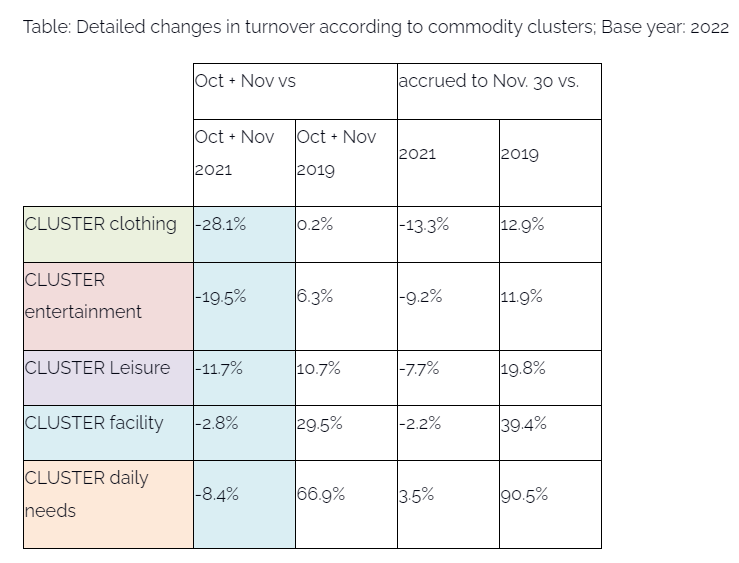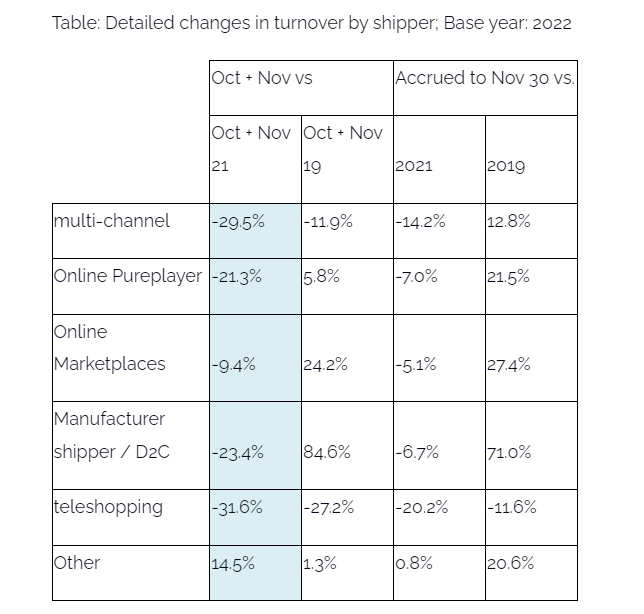German online sales shrink 16.8% around Christmas

In the period from October 1st to November 30th, which includes Black Friday, German sales of online retailers decreased 16.8 percent when compared to the same period in 2021. It is the first time that this decrease happens, since researchers started measuring in 2014. However, an increase of 13.1 percent remains when compared to 2019.
During October and November, online retailers usually notice higher sales numbers as consumers start preparing for the holidays. However, a study by the German federal association for ecommerce, Bevh, shows that this is not the case in ecommerce in Germany in 2022. From January to December, the researchers questioned 40.000 Germans aged 14 and older about their online and mail-order spending behaviors.
Fashion industry shows biggest loss
When compared to 2021, the fashion industry decreased 28.1 percent in turnover in October and November this year. Sales in those months this year are almost at the same level (0.2 percent increase) when compared to that period in pre-corona year 2019. According to the researchers, this shows that retailers have a hard time pushing through price increases.
Food, drugstores and pet supplies can achieve growth in sales this year.
Other clusters are more resilient. The clusters food, drugstores and pet supplies can still achieve growth this year when compared to 2021 as a whole. Sales of household goods and appliances reached stable sales with an increase of 2.9 percent. Furniture, lamps and decorative products (decrease of 9.1 percent) and home textiles (decrease of 5.8 percent) lost less than the rest of the market.

‘Minus in online mail-order for 2022’
“Any hopes for the Christmas business cannot come true. This is one of the reasons why we will record a minus in online mail-order for the year as a whole” said Martin Groß-Albenhausen, deputy general manager at Bevh. “The industry can do little to counteract the double burden of the previous year’s sales, which were particularly strong due to the corona lockdown, and the general slump in consumption. Clothing and consumer electronics in particular are collapsing, although the latter is usually a strong product category during cyberweek and the Christmas quarter.”
Multichannel retailers have -29.5% sales
A striking find in the research is the strong decrease in sales of multichannel retailers. When compared to October and November 2021, their online sales decreased 29.5 percent. “They were unable to save anything from the growth in 2020 or 2021 and even compared to the pre-corona level of 2019, they lost 11.9 percent.”
‘D2c sellers show a growth in sales when compared to 2019.’
Direct-to-consumer sellers lost 23.4 percent in sales when compared to October and November in 2021. However, they increased almost 85 percent when compared to that period in 2019. When compared to 2019 overall, sales increased 71 percent.

Current burdens on business
The Bevh also contacted its members, who represent 90 percent of sales in the German b2c business. A large majority (74.3 percent) think that consumer uncertainty is the current biggest burden on their business. In second place is increasing purchasing costs (64.3 percent), followed by increasing costs for packaging and logistics (50 percent).

Comments